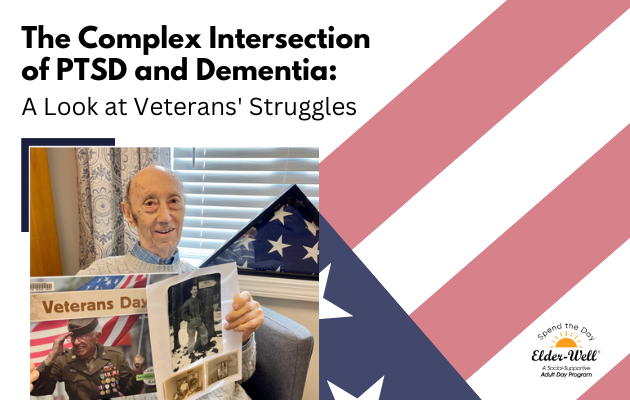The Complex Intersection of PTSD and Dementia: A Look at Veterans’ Struggles

As we approach Veterans Day, it is essential to remember and honor the sacrifices made by our nation’s heroes. Many veterans face unique challenges, and one of the lesser-known intersections of these challenges is the complex relationship between post-traumatic stress disorder (PTSD) and dementia. In this blog post, we’ll explore how PTSD can affect veterans with dementia and shed light on the additional difficulties that their caregivers face while caring for them.
Understanding PTSD and Dementia:
- PTSD in Veterans:
Post-traumatic stress disorder is a mental health condition that can develop in individuals who have experienced traumatic events. Veterans, particularly those who have served in combat, may be at a higher risk of developing PTSD due to their exposure to highly stressful and traumatic situations during their service.
- Dementia in Veterans:
Dementia is a broad term used to describe a decline in cognitive function that interferes with daily life. While dementia can affect anyone, veterans may be more susceptible due to factors such as age, traumatic brain injuries, or exposure to toxins during their service.
The Intersection:
For veterans who have both PTSD and dementia, the intersection of these two conditions can create a challenging and often distressing situation:
- Aggravation of PTSD Symptoms:
Dementia can lead to confusion, memory loss, and behavioral changes, which can exacerbate the symptoms of PTSD. Veterans may re-experience traumatic events, become more anxious, or have difficulty distinguishing past trauma from present reality.
- Communication Challenges:
Veterans with PTSD and dementia may have difficulty expressing their emotions or needs, making it challenging for caregivers to provide appropriate support and comfort.
- Caregiver Struggles:
Caregivers of veterans with both conditions face additional difficulties, including:
– Coping with the emotional toll of caring for a loved one with complex needs.
– Balancing the care required for both dementia and PTSD, which often involve different approaches.
– Seeking specialized care and support services, which may be limited or hard to access.
Support and Resources:
If you are a caregiver of a veteran with PTSD and dementia, know that there is help available:
- Seek Professional Assistance:
Consult with healthcare professionals who specialize in geriatric care and mental health. They can provide guidance on managing both conditions effectively.
- Support Groups:
Joining caregiver support groups can provide you with a sense of community and valuable insights from others facing similar challenges.
- Respite Care:
Take advantage of respite care services to ensure you have the opportunity to rest and recharge while knowing your loved one is well cared for.
On Veterans Day, let us remember and honor our veterans, particularly those who face the dual challenges of PTSD and dementia. By raising awareness of these issues and offering support to both veterans and their caregivers, we can work towards ensuring that those who have served our country receive the care and respect they deserve. Together, we can make a positive difference in their lives.
